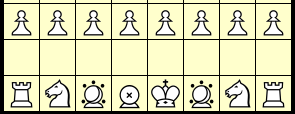Piececlopedia: Chameleon
Historical notes
The chameleon was invented by Robert Abbott for his game Ultima . The rules for Ultima were first published in 1962.See also another piece also called Chameleon.
Movement


The chameleon moves as a chess queen, but does not capture this way, and can never move to an occupied square. When a chameleon captures, it does so by capturing in the manner of piece it is capturing. Chameleons can not capture other chameleons. (In Ultima, a chameleon can not capture an immobilizer, but can immobilize it.)
Movement diagram
In the diagram below, the chameleon (represented by the symbol for the bishop, since the game Ultima uses a chess bishop to represent the chameleon) can move to any of the circles marked with a black circle. It can also capture the rook or the bishop.
![]()
![]()
![]()
![]()
![]()
![]()
![]()
![]()
![]()
![]()
![]()
![]()
![]()
![]()
![]()
![]()
![]()
![]()
![]()
![]()
![]()
![]()
![]()
![]()
![]()
![]()
![]()
![]()
![]()
![]()
![]()
![]()
![]()
![]()
![]()
![]()
![]()
![]()
![]()
![]()
![]()
![]()
![]()
![]()
![]()
![]()
![]()
![]()
![]()
![]()
![]()
![]()
![]()
![]()
![]()
![]()
![]()
![]()
![]()
![]()
![]()
![]()
![]()
![]()
Remarks
A piece can never attack the chameleon without being attacked back, but conversely, the chameleon can never attack another piece without being attacked back also. A king can never move next to an enemy chameleon.Note from David Howe: The diagram does not seem right. The black rook is a coordinator, which the white chameleon cannot coordinate with its king. The black bishop is another chameleon, which the white chameleon cannot capture. Ah, now I get it -- they're ortho-chess pieces. Should be using Ultima pieces, otherwise the diagram is misleading.
This is an item in the Piececlopedia: an overview of different (fairy) chess pieces.
Written by Benjamin C Good.
WWW page created: September 14, 1998.
Modified: D. Howe on March 5, 2000: Chameleon is represented by a bishop, not a knight.
